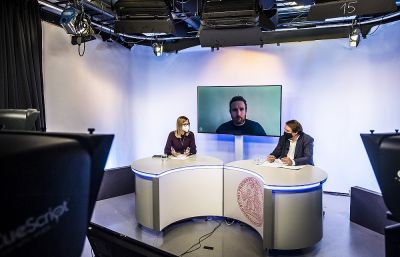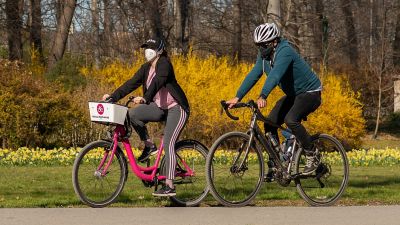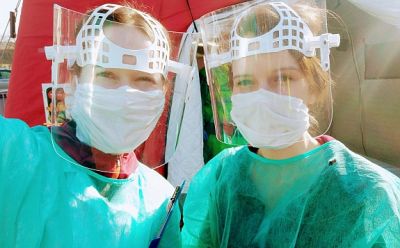“My respect for the novel coronavirus grew proportionately the more we learned about it,” recalls Dr. Milan Trojánek from the Department of Infectious Diseases at the Second Faculty of Medicine and Bulovka University Hospital. He admits there were many aspects of the virus that caught the medical profession by surprise; at the same time, even early on, he disliked comparisons to the flu.
When he looks back now, after three waves, Dr. Trojánek says it was the precisely the deadly complications they witnessed in Covid patients that caught doctors off guard at the start. This despite the fact that Bulovka University Hospital specialises in infectious and tropical diseases, with the largest clinic of its kind in the Czech Republic. It was there, that the first three Covid patients in the Czech Republic were hospitalised on March 1, 2020. Milan Trojánek was on duty that first Sunday.
“It was an extremely taxing period and we wouldn’t have managed if we hadn’t had help from other departments and clinics,” he remembers. Over the year, medical professionals learned new ways of cooperation with colleagues from different fields: “On a personal level it was, paradoxically, pleasant. That sounds absurd, given the enormous amount of pressure and daily stress we were under, but analysing concrete problems with other specialists over the year was very beneficial and mutually rewarding. The Covid centre became a meeting point for doctors from across the medical profession and we learned together that treating methods of Covid patients needed to be different, more complex.”
Also extremely important during the unprecedented times, was help provided by volunteers and med students. They provided support and freed up specialists to focus primarily on patients or research into the virus, and are visible to this day, now helping at vaccination centres and with the vaccination drive. Two Charles University students, Irena Al Masani and Michal Beneš were nominated for the Angel among Health Care Workers prize, Dr. Trojánek says.
One thing that is apparent now deep into the second year of the pandemic, is that human beings will have to learn to live with the virus – it isn’t going anywhere and variants such as Delta have complicated the situation and led to renewed and alarming spikes. Dr. Trojánek says a crucial factor moving forward is vaccination: “It is one way of fighting the infection but – on its own – it may not be enough,” he admits.
According to the doctor, anti-pandemic measures such as mask-wearing and regular testing remain important in keeping the infection rate down. He says an enormous push must be made to catch and possibly eliminate early new mutations which could spread quickly among the public, especially among population groups that were, until now, low-risk. Even if the Czech Republic appears to have come out of the worst momentarily, there are correlations with last summer, when the virus also appeared to be beaten. In short, experts can’t afford to underestimate the risk.
“A lot of us, myself included, underestimated [the virus] during the first wave and didn’t expect there would be such wide repercussions. Today, I see the situation differently,” says Trojánek. He agrees it was a mistake last year when some downplayed the dangers, or the benefits of masks and testing. When the virus roared back in the autumn of 2020 (after students returned to schools and a large part of the work force returned to the work place after months of home office), the sceptics were proven correct. It was a mistake which had huge repercussions moving forward. The Czech Republic went from being one of the best handlers of the crisis on a domestic level in the first wave to a warning for others, as cases piled up and deaths increased. “Our experts came up short: everyone had their own opinion and each had to put in their 2 cents. It muddied the situation, confusing the public and we let our guard down. All were respected professionals and experts but suddenly no one knew who was right and who was not.”
Many experts on infectious diseases, as a result, decide to stop commenting developments in the media, and focused their efforts instead on gaining a better understanding, organising and meeting in seminars, sharing information and advice on patient treatment. They cooperated with medical faculties, the Institute for Postgraduate Medical Education and the Czech Medical Chamber, which began training the new “discipline” of Covid-19 vaccination.
According to available sources, there are almost 300 candidate vaccines in development worldwide, 13 of which are in practical use and four of which received the green light for use in Europe: Pfizer/BioNTech, Moderna, AstraZeneca, Johnson & Johnson).
Dr. Trojánek says that he is pleased with how the vaccination drive ramped up with help from Medici PRO Očkování and that interest among the public has been high; in truth, he expected worse. But he warns that even vaccination has its limits, making clear it is not a panacea that will solve everything. He says the public needs to be fully informed about what vaccines can do and what they cannot. He also notes that the Covid-19 vaccines have a higher reactogenicity than common vaccines. “If you’ve had at least jab you will have encountered some of the effects – a pain the shoulder, a temperature, cold-sweats at night, muscle pain, tiredness,” he explains.
Specialists such as Milan Trojánek and others have also had their hands full combatting alarmist disinformation or hoaxes when it comes to vaccination against Covid. A new strategy involving leading experts across various scientific disciplines led to an an awareness campaign refuting the some of the worst alarmist claims and hoaxes. Viewers can look up various topics at the Youtube channel of the Ministry of Health of the Czech Republic.
A number of high profile proponents of conspiracy theories, have spread false claims that vaccination caused infertility in women – claims that gained traction in Europe and the United States.
According to Milan Trojánek, more than 130 million cases natural infection have already been diagnosed. During the pandemic, problems in reproductive medicine would already have registered if the claim were true: “A natural infection also induces an immune response against the S protein, yet this speculation was not confirmed.” And, according to the doctor, no problems had been shown during pregnancy in women in studies examining whether vaccination posed a danger for reproduction. “You know, voicing suspicions is a very effective source of doubt. Denying disinformation with hard data remains very challenging!”
Vaccination monitored in real time
Vaccines and vaccine safety is now essentially monitored in real time, essentially online. There is a system in place in the European Union for monitoring and assessing adverse reactions of various medicines – the European Medicines Agency. In the US, the equivalent is the Vaccine Adverse Event Reporting System (VAERS), focused exclusively on vaccines undesired effects.
“Data is being collected continuously! For example, several individuals were able to demonstrate the development of thrombotic complications after receiving vector vaccines. Colleagues in Germany then described the pathophysiological mechanism (how vaccination-induced thrombosis occurs) and suggested how to proceed in similar cases. The risk is extremely low, but it does exist. If I were an at-risk patient at risk of dying from a Covid-19 infection versus ending up in intensive care, the benefit of vaccination is incomparable. If I were a young and healthy woman, without risk factors, I would consider receiving a vector vaccine. I understand some countries have restricted their use. Based on recommendations from the Ministry of Health of the Czech Republic and the Czech Vaccine Society, we are similarly opposed to these vaccines.”
| Milan Trojánek, Ph.D. |
| Milan Trojánek is a physician and educator at the Infectious Diseases clinic of the Second Faculty of Medicine at Charles University and and Bulovka University Hospital and an expert at the Institute for Postgraduate Medical Education. |



























